International Women's Day 2021
-
08 Mar 2021
IWD celebrates the social, economic, cultural and political achievements of women. Today, the NUJ's women explain why female leaders in the industry can be game changers.
This year’s theme is #ChooseToChallenge by calling out gender bias and inequity. International Women's Day is about:
- celebrating women's achievements
- raising awareness about women's equality
- lobbying for accelerated gender parity
- fundraising for female-focused charities
For many of us this it is through activism and solidarity with our union the NUJ where we achieve these aims. Tweet #ChooseToChallenge with the #NUJ for #IWD2021 and link to what a few of the union's inspirational women have to say:
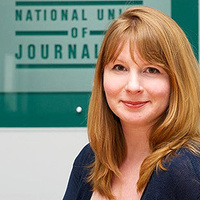
Michelle Stanistreet
-
General secretary
-
NUJ
This year's International Women's Day theme is about choosing to challenge and call out gender bias. It's about fighting against inequality and for accelerated gender parity. It is also about celebrating women's achievements. The NUJ believes women's voices should be heard loud and clear in the union and across the media and publishing industries.
At last week's TUC Women's conference, we highlighted how the pandemic has had a disproportionate effect on women and their work. Our reps negotiate family-friendly policies, job sharing, commitments to flexible working and practical measures to achieve work- life balance. We fight for freelance rights.
Our stand at the BBC, backing scores of women with equal pay claims, has won millions of pounds for members. And, as general secretary, I was proud when arm in arm, members – men and women – accompanied Samira Ahmed each day to her ultimately successful employment tribunal.
The words equal opportunities run through all our training and reps' programme like Blackpool rock. We call out those who abuse and harass women at work or online. We tackle companies with shocking gender pay gaps. And we will be there to share a cuppa at the menopause café coming (virtually) to you at our next Delegate Meeting in May. So today, this International Women's Day, show your support and tweet #ChooseToChallenge with the NUJ.
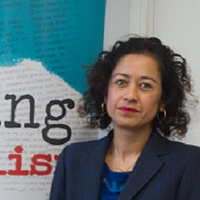
Samira Ahmed
-
Broadcaster who won a high-profile equal pay case against the BBC
The solidarity of being part of a union has been such an important part of my life. I've been grateful for the advice and support of my union reps and colleagues on many occasions over the years. They've given me confidence instead of fear.
It's something I always tell students preparing to start a career of their own: Don't underestimate the importance of the security and inspiration of being part of a union with older and younger women able to support each other, exchange advice and experience; all with the shared goal of working to make things better for everyone.
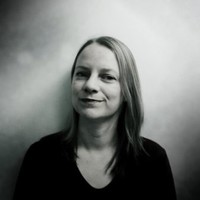
Catherine Brereton
-
National Executive Committee Books rep
-
NUJ
Gender pay gap reporting exposed the gravity of pay inequality in book publishing, a predominantly female industry. The first few years showed patchy improvements but then the requirement to report was suspended. So the gendered impact of the pandemic risks being invisible, in this as in other sectors. Pay transparency has long been a serious problem in publishing. Without better pay transparency we cannot address systemic issues of low pay, unequal pay and a lack of diversity.
I am encouraged to see that due to the hard work of women in prominent positions and workers across the industry working collectively in company forums, social media networks and of course through our trade unions, we are starting to see change. The NUJ can help empower its members to drive that change in their own workplaces.
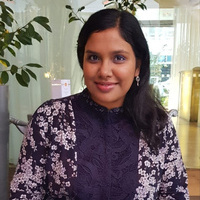
Saadeya Shamsuddin
-
Senior journalist at BBC Radio London and trustee of the NUJ's George Viner Memorial Trust
In my experience female leaders are game changers – not just for those they manage, but for their colleagues, peers and the organisations that employ them. As a journalist working across numerous print and broadcast newsrooms over the last decade, the perspective, lived experience and expertise female editors and journalists bring to the table has been intrinsic to a more inclusive and equitable reflection of society, through the stories we cover and public figures and organisations we hold to account.
It's the very essence of being a public broadcaster. From the vaginal mesh scandal to the report revealing black mothers being four times more likely to die in childbirth in the UK – such ground-breaking stories coming to light and their ripple effect on wider communities have relied heavily on a strong network of brave women, allyship and female-led editorial.
Former BBC editor and broadcaster Carrie Gracie was one such game changer – she admirably and irrevocably transformed the landscape of equal pay and created a legacy that empowered those that followed in the fight for equality. Recognition of the ethnicity pay gap is going to be the next big challenge for the media industry – even more so for women of colour, many of whom are fighting for a level playing field just to get the same opportunities as their white sisters. The NUJ has been pivotal in fighting for justice and truth and I'm proud to be part of a union led by another inspirational female leader – Michelle Stanistreet.
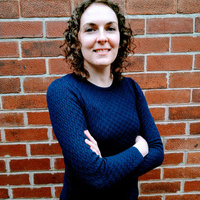
Georgina Morris
-
Crime reporter, NUJ rep with the Yorkshire Post and Yorkshire Evening Post Chapel,
While I've been lucky enough not to need help with workplace issues of my own since joining the NUJ as a trainee reporter in 2008, I've seen over and over how it can offer a collective voice, challenge unfair practices and support individual members. I'm really proud to be a part of it.
As a rep, I've learned leadership, communication and negotiation skills that have helped to build my confidence in the workplace. It made such a difference when I was going for more senior roles I've held in the past that involved leading a team.
By chance, I've worked for female editors for almost my whole career and the majority of my news editors have been women too. It means I've never felt that a move into a leadership role is unattainable simply because I'm a woman, although I know that's not true everywhere.
If media organisations want to truly reflect the communities they serve then they need to do much more to ensure diversity in their workforces at every level, not just the most junior. It needs a consistent, long-term commitment – not just a token committee or mentoring scheme that's allowed to fizzle out until the next year's gender pay gap figures are published.
I'd love to see more women getting active within the union too, whether that's becoming a workplace rep, playing a part in your local branch, or joining one of the union's national committees. If we're serious about wanting women's voices to be heard, then we must continue to speak up.
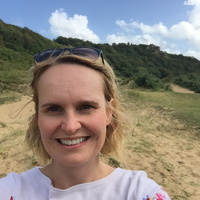
Rachel Howells
-
Member of the NUJ Welsh Executive Council and NUJ Cymru training Wales project manager
Why is important that women have a voice in the media? It's important that journalists represent the society on which we report. We perhaps think of the obvious issues when we think about the differences between women and men, things like sexism, sexual harassment, domestic abuse, equal pay.
But, of course, women experience differences across very many areas of life – working, ageing, parenthood, caring, healthcare, sport, crime, the justice system, politics, activism, social media, business, finance, economic opportunities, education (home schooling!) - the list goes on. It's crucial that we aim for diversity in the newsroom and in our coverage, and part of that is listening to women of all ages, all races, all backgrounds. That's the only way to do our jobs properly and reflect what's really happening in society.
I believe we need the same diversity in leadership, too. I have been lucky to work for very good bosses, both male and female, over the years, and I don't think there's an innate difference in either gender's ability to manage and lead. But I do feel that we bring different perspectives and experiences with us, and so a good gender balance is the ideal. I feel my experience of motherhood, for example, makes me understanding of caring responsibilities that my colleagues might be facing.
And maybe better at handling difficult characters, now that I know how to talk a toddler out of a tantrum! More seriously, in common with many women, I have definitely experienced my share of sexism over the years, so I'm quite alert to that now that I am in a leadership role, and I try to call it out or support colleagues experiencing it. I also feel it's a sort of sacred duty to try to pull up others behind me. It's a great feeling to be able to support other women and give them opportunities and voices.
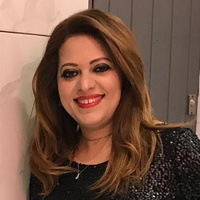
Shereen Sherief Youssef
-
BBC programme producer and podcaster, vice-president of BBC World service
Being part of a union was always considered essential throughout my career. Being part of a union it means you don’t have to be alone in the difficult times against harsh management or think solo about how to progress in your career. I joined NUJ from the first week I joined BBC and I never regret that decision. NUJ has helped me throughout my years in BBC by occupying me with knowledge of my rights and providing support in the times of dispute with the management. They negotiated many BBC decisions which led to better deal for all BBC staff including myself such as salaries, sick leave policy, scheduling etc.
The NUJ allows voices of individual journalists to be heard and made into a goal of the whole union.
It is very crucial for the media to be a safe and balanced zone for women voices and having women in leadership roles gives confidence to all women that they can achieve their goals whatever they are as long as they work for them. It is very important to fight the stereotyping ideas of women in work place dominated by men and I see the NUJ is a great example to reflect that through a strong woman leadership and by giving women voices priority in most of the union activities. I am very proud to be part of the NUJ representative faces.
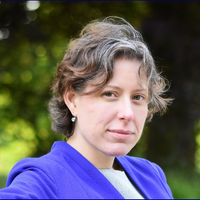
Lynn Degele
-
Chair, Oxford Branch, Disabled Members Council, equality rep, Taylor & Francis chapel
I believe women leadership roles are vital to ensure we include a wide range of views in all aspects of life. Many disabled people do not have role models or see representation at work.
Being involved with the NUJ has given me career progression and increased my confidence. As a disabled woman, I have been welcomed, given a voice and platform, and given a space to be.
Massi Faraji
-
Producer
-
Iran International
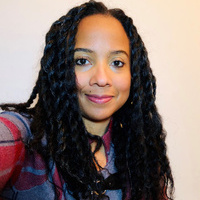
Miguela Gonzalez
-
Worked with BBC Wales News for 14 years, and is now working in the area of diversity and inclusion
-
She is member of the Welsh Executive Council
If journalism is to truly reflect society, then gender balance in the newsroom is essential to capturing all of the stories that really have an impact on people's lives. Though we're on the right track amongst journalists in general, true impact will only be felt when women – and other underrepresented groups – are properly represented in leadership roles.
Final decisions on stories, tone and quite frankly, the delegation of opportunity, can only be made fairly if representation is fair. Being part of the NUJ ensures there is allyship and a united force that works toward achieving equality in the newsroom and champions the rights of journalists. There’s a huge satisfaction in being part of that.
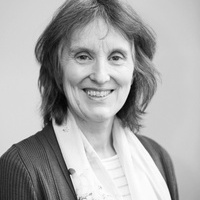
Jackie Craft
-
Content editor on regional weekly newspaper Stockton Times and monthly magazine The Northern Farmer
-
She is a member of the Darlington chapel
In my 20 years in the newspaper industry, I have seen a significant improvement in terms of the number of women in senior positions, culminating most recently with our regional daily paper appointing its first ever female editor. I think it is incredibly important that as women, we continue to challenge the traditional hierarchies that still sometimes act as a bar to women progressing up the career ladder.
As a union rep for the past eight years, I have been privileged to support members as they have raised concerns about inequality and have been inspired by female colleagues who have courageously shone a light on how editorial structures can be improved for the benefit of women.
Exactly a century ago, my grandmother gained a teaching degree, a remarkable achievement at a point in history when women were fighting for emancipation. However, on marrying my grandfather, she had to give up her promising career, as it was not acceptable for married teachers to work, a situation that continued until 1944.
It is a testament to the women who have blazed the trail before me that our situation in all aspects of life today is very different. I would like to think that my grandmother would be proud of me for the small part I have played in helping to continue that change.
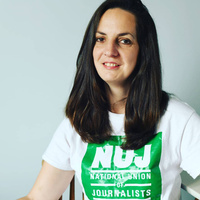
Natasha Hirst
-
Freelance photographer
-
NEC Disabled members' rep, chair of Equality Council, chair of Photographers' Council, vice-chair Cardiff and SE Wales Branch, delegate to TUC Women's and Disabled Workers conferences
Getting involved with my branch helped me to get my freelance career back on track after three years out of work due to fleeing domestic abuse. I have made many great friends and built up professional networks that have brought many new opportunities my way. At my third branch meeting I was nominated for some casual vacancies and unexpectedly found myself elected to the NEC! I value the opportunity to make a difference through my union on a wide range of issues that affect our members.
Diversity is crucial to journalism to ensure that our communities feel represented and engaged but we have a long way to go. Women have different life experiences and perspectives to bring and journalism provides us with many opportunities to share the stories that we feel are important.
Women have been able to make a huge difference in the trade union movement and in their workplaces and communities. Whether this is behind the scenes supporting other people or leading groups or organisations, we all have more power than we realise to create change.
Importantly, leaders are involved with making or influencing decisions that will affect many other people. Where we don't have women leaders, those decisions aren't informed by our life experiences and will reinforce the status quo that perpetuates inequality through society. As a disabled woman, I feel very strongly that diverse role models inspire others to aim high and we all have a role to play in supporting new people into leadership roles.
Fariba Sahraei
-
Iran International
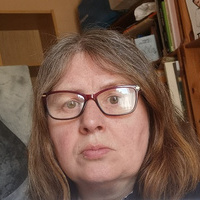
Julia Armstrong
IWD was inspired by women trade unionists fighting for decent pay and we still have our battles to win for equal pay today. I have always been proud to fight alongside inspiring women - our place is in the union, at all levels.
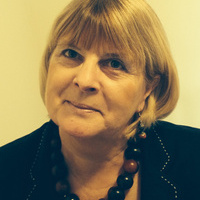
Jenny Sims
-
Freelance journalist
-
NUJ Life member, activist and co-chair of the NUJ’s 60+ Council
I do a great deal of voluntary work for the NUJ, perhaps in return for some of what the union has given me: continuous professional skills training, invaluable advice over pay, rights, support, contacts and lifelong friends. I am on the Welsh Executive Council and did a brief spell on the National Executive Council.
I have seen how important the presence of women on decision making councils and committees is. They are good listeners, prepared to change their minds, but when determined to change the minds of others generally do not have to do so by bullying. We need more women's voices in the industry and the union for many reasons, particularly to continue the fight for equal pay and to strengthen women's rights at work.
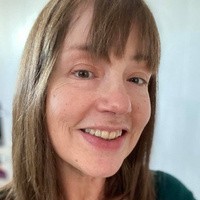
Ann Galpin
-
Freelance PR & communications, campaigner
-
Chair of Disabled Members' Council, NUJ Cambridge Branch Equality Officer, TUC Disabled Workers' Committee, co-chair and NUJ representative and co-chair of Trade Union New Independent Living Support Service organising group
Relocating to the UK after working in Hong Kong and Brussels, I was encouraged to learn that NUJ actively represented journalists across PR & Communications, Books and Magazines, and New Media as well as more traditional journalistic sectors such as Newspapers and Broadcasting. The NUJ and my branch supported me through a workplace bullying and harassment situation and empowered me to get involved with the union, including tabling and speaking to a Zero Tolerance motion at my first Delegate Meeting.
I was encouraged to join the Disabled Members Council and the next thing I knew I was speaking on workplace mental distress at TUC Disabled Workers Conference. As the only person to speak openly about mental distress at that Conference, it was effectively a public coming out for me. Many other trade union members confided about their own lived experience of mental distress and told me they felt they couldn't disclose to their employer because of stigma.
Becoming active in the NUJ empowered me to use my lived experience as a disabled woman to improve the situation for others. Disabled women are less like to secure paid employment and experience a significant pay gap when they do. Gender equality is a collective issue and disability equality is too.
I campaign on still in the hope that the social model of disability and the UN Convention on the Rights of Disabled Persons will be implemented in domestic legislation and every arena where disabled people remain excluded and undervalued. The solidarity among NUJ equalities activists buoys me to believe one day it really will be OK for our members to say when they don't feel OK.
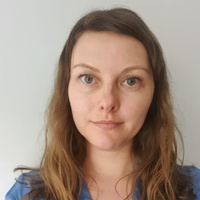
Tara Oakes
-
Producer, Video News
-
Thomson Reuters. Co-Mother of the NUJ chapel and Health and Safety Rep.
Being active in the union makes me feel empowered: you don’t have to sit there and let things happen, but can engage positively to make circumstances better for everyone. Women need to have a voice in the workplace as well as in the media to avoid them being treated as the exception, rather than the rule.
Our committee are currently all female, and we hope that our visibility and hard work will encourage everyone - regardless of how they identify - to recognise the power of hearing women’s voices.
